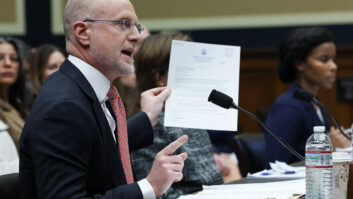This article has been modified to clarify that the subject is a series of petitions filed last year, not the petition filed this week.
While the industry digests the 998 objections that Prometheus and two other advocacy groups filed with the FCC on May 17, the Federal Communications Commission has issued a firm “no” in a separate Prometheus filing — one that may be of interest to low-power FM stations, AM operators, LCRA supporters, and those watching for a future tug of war between AM radio stations and LPFMers.
Last year the Prometheus Radio Project filed a series of petitions with the FCC saying the commission’s 2017 formal order on the siting of cross-service translators for AM stations was arbitrary, capricious, contrary to the goals of the Local Community Radio Act of 2010, and insensitive to the needs of community-oriented noncommercial educational LPFM providers.
The issue surrounds the commission’s decision not to adopt a specifically defined distance limit on the siting of cross-service translators for AM stations with a 2 mV/m contour exceeding 25 miles.
[Read: Prometheus Petitions FCC to Slow the AM Translator Train]
As part of its AM revitalization efforts, the FCC amended a rule in February 2017 surrounding the siting of an FM translator that is rebroadcasting an AM station. The draft of this Second Report and Order differed from earlier documents in that it did not include any specific distance limits on the siting of translators.
This was done intentionally, the FCC said, to give AM stations flexibility in using a cross-service translator to serve its core market — assuming that it still did not extend its signal beyond the station’s core service area.
Prior to the circulation of this Second R&O draft, the rules were quite specific: a cross-service FM translator had to be located such that its 60 dBμ contour was contained within the lesser of either the AM station’s daytime 2 mV/m contour, or within a 25-mile radius centered at the AM station’s transmitter site.
As the FCC put it: “refraining from adopting a limit would be consistent with the objective, articulated in the [AM Revitalization Further Notice of Proposed Rulemaking], to provide flexibility to an AM station using a cross- service translator.”
Prometheus objected, however. It argued that without the proposed 40-mile limit, expanded siting options for cross-service FM translators would lead to an increase in the short-spacing of low-power FM stations from multiple directions, and would significantly restrict incumbent LPFM stations’ ability to relocate in the event of lost transmitter sites.
The commission dismissed Prometheus’ objections at the time and went ahead and approved the Second R&O without any mention of the 40-mile limit. The commission said Prometheus neglected to quantify the number of LPFM stations that would be affected and noted that the new rules still made space for mandated minimum spacing and contour overlap protections.
Prometheus responded again with a stay petition and reconsideration petition and demanded a freeze on the processing of related applications.
[Read: Prometheus Explains Its Translator Argument]
The FCC again disagreed. “Despite Prometheus’s claims, the commission did not fail to account for any adverse impact that the order will have on LPFM stations,” the FCC said. “Rather, the commission found that the public interest benefits of providing greater flexibility for AM stations to locate cross-service translators, even beyond the 40-mile limit, were significant and that nothing in the record, including Prometheus’s February Ex Parte, demonstrated harm to LPFM stations that would outweigh these benefits.”
Nor does the commission agree with Prometheus’ assessment that it violated the LCRA by not adopting a set distance limit on siting of cross-service translators.
“[The order] addresses community needs by allowing improved primary service by AM broadcasters” such that the requirements of Section 5 of the LCRA have been met, the FCC said.
The commission rejected Prometheus in another way: its assessment that the FCC favored expansion of commercial stations, “many of which are controlled by large national ownership groups at the expense of noncommercial local LPFM,” Prometheus told the FCC.
Elimination of the set distance limit does not favor expansion of commercial stations at the expense of noncommercial stations, the FCC said. “The increased flexibility in siting of cross-service translators will benefit both commercial and noncommercial AM stations … [and] the potential for harm to noncommercial LPFM stations resulting from this increased flexibility is remote.”
As a result, the commission rejected Prometheus’s request for reconsideration and dismissed its stay petition as moot.






